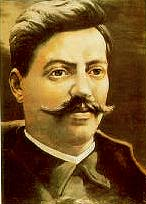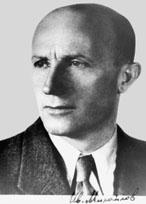Internal Macedonian Revolutionary Organization
|
|
The Internal Macedonian Revolutionary Organization (in Macedonian: Vnatrešna Makedonska Revolucionerna Organizacija, Внатрешна Македонска Револуционерна Организација, in Bulgarian: Vatreshna Makedonska Revolyucionna Organizaciya, Вътрешна Македонска Революционна Организация, VMRO), commonly known in English as IMRO, was the name of a revolutionary political organization in the Macedonia region of the Ottoman Empire, and later in Bulgaria and the Macedonian regions of Greece and Yugoslavia. In the 1990s it was revived as a nationalist political party in both the Republic of Macedonia and Bulgaria.
| Contents |
Origins and struggle against the Ottomans
The organization was founded in 1893 in Ottoman-occupied Solun Thessaloniki by a group of Bulgarian revolutionaries led by Hristo Tatarchev and Dame Gruev under the name Bulgarian Macedonian-Adrianople Revolutionary Committee (BMARC). BMARC later changed its name to Secret Macedonian-Adrianople Revolutionary Organization (1902) and to Internal Macedonian-Adrianople Revolutionary Organization (1906). After being disbanded during the Bulgarian occupation of Macedonia (1915 - 1918), the organization was revived in 1920 under the name Internal Macedonian Revolutionary Organization, under which it is generally known nowadays.
The goal of the original Committee was to unite all elements dissatisfied with the Ottoman oppression in Macedonia and the Adrianople Vilayet, eventually obtaining political autonomy for the two regions. In this task the organisation hoped to enlist the support of the local Vlachs, Greeks and even Turks. Efforts were concentrated on moral propaganda and the prospect of rebellion and terrorist actions seemed distant. The organisation developed quickly: only in a matter of a few years, the Committee had managed to establish a wide network of local organisations across Macedonia and the Adrianople Vilayet. These usually centered around the schools of the Bulgarian Exarchate and had as leaders local or Bulgarian-born teachers.
The initial period of idealism for IMRO ended, however, with the Vinitza Affair and the discovery by the Ottoman police of a secret depot of ammunition near the Bulgarian border in 1897. The wide-scale repressions against the activists of the Committee led to its transformation into a militant guerilla organisation, which engaged into attacks against Ottoman officials and into punitive actions against suspected traitors. The launch of pro-Serbian and pro-Greek guerilla detachments into Macedonia at the end of the 19th century contributed additionally to its establishment as a nationalistic organisation. By 1903 the Greeks and the Serbians were as decidedly enemies for IMRO as were the Turks. Murder and terrorism were the usual tactics of the organisation not only against the rival military factions, but also against Greek and Serbian teachers and priests.
IMARO_Activists_-_Bulgarian_Comitadjii_-_Captured_by_the_Ottoman_Police.jpg
Though IMRO was pro-Bulgarian since its establishment, it split up early into two major fractions. The Autonomists favoured the idea of an autonomous Macedonia whereas the Supremists resorted to terrorism against the Ottomans and the kidnapping of foreigners in the hope of provoking a war and thus Bulgarian annexation of Macedonia. In 1903 they organised an Ilinden uprising against the Ottomans in Macedonia and the Adrianople vilayet, which was crushed with much loss of life, including the life of Delchev, who had actually opposed the rising as premature.
The failure of the 1903 rising resulted in the dispersal of the autonomy seeking, left-wing faction of IMRO and its becoming largely an agent of Bulgarian expansionism. Armed groups sponsored by all three neighboring states fought the Ottomans and each other, and the Ottomans took reprisals. The resulting turmoil played a large part in provoking the Balkan Wars which broke out in 1912.
The result of the Balkan Wars was that Macedonia was partitioned between Bulgaria, Greece and the new state of Yugoslavia, with Bulgaria getting the smallest share. IMRO, now led by Todor Alexandrov, was largely driven out of the Greek and Yugoslav sections of Macedonia, but it maintained its existence in Bulgaria, where it played a role in politics as an extreme right-wing nationalist party, urging a renewed war to liberate Macedonia. This was one factor in Bulgaria allying itself with Germany and Austria-Hungary in World War I.
The interwar years
The postwar Treaty of Neuilly again denied Bulgaria what it felt was its share of Macedonia, and IMRO began sending armed bands called comitadjis into Greek and Yugoslav Macedonia to assassinate officials and stir up Macedonian nationalism. In 1923 IMRO agents assassinated the Bulgarian Prime Minister, Aleksandar Stamboliyski, who favoured a peace treaty with Greece and Yugoslavia so that Bulgaria could concentrate on its internal problems.
In 1924 IMRO came under the leadership of Ivan Mihailov, who became a powerful figure in Bulgarian politics and favoured the "internationalisation" of the Macedonian question. Numerous assassinations (over 1,000 by one account) were carried out by IMRO agents in many countries, the majority in Yugoslavia. The most spectacular of these was the assassination of King Alexander of Yugoslavia and the French Foreign Minister, Louis Barthou, in Marseille in 1934 in collaboration with croatian Ustase.
This action finally provoked the Bulgarian military to take control and break the power of IMRO, which had come to be seen as a fascist gangster organisation inside Bulgaria and a band of assassins outside it. In 1935 Mihailov was forced to escape to Turkey. IMRO kept its organisation alive in exile in various countries, but ceased to be an active force in Macedonian politics. Mihailov assisted Ustase in German-occupied Yugoslavia in 1941. In September 1944 he arrived in Skopje only to find out that the destiny of Macedonia had already been decided within the framework of Yugoslavia. Mihailov eventually ended up in Rome where he published numerous articles, books and leaflets on Macedonia. In 1945 the Vardar Macedonian area became part of Communist Yugoslavia, all non-Communist political activity was suppressed and the supporters of the IMRO were prosecuted and tortured by the pro-Serbian authorities.
The modern IMRO
With both Bulgaria and Yugoslavia under Communist rule, there was no scope for IMRO's revival. After the death of Josip Broz Tito in 1980 Yugoslavia began to disintegrate and democratic politics in Macedonia revived. Many exiles returned to Macedonia from abroad, and a new generation of young Macedonian intellectuals rediscovered the history of Macedonian nationalism. In these circumstances it was not surprising that the IMRO name should be revived. A new IMRO was founded on June 17 1990 in Skopje. Although IMRO claims a line descent from the old IMRO, there is no real connection between the old IMRO and the new one.
The Republic of Macedonia became independent in November 1991, and IMRO emerged as the leading nationalist party. The country's first presidential elections in 1994, however, were won by a moderate former Communist, Kiro Gligorov. IMRO's appeal to Macedonian nationalism was helped by the refusal of Greece to recognise the new state. But IMRO was kept out of power until 1998 by the combination of President Gligorov and Prime Minister Branko Crvenkovski, of the Social Democratic Union of Macedonia (SDSM).
By the later 1990s the main issue in Macedonian politics was relations with the large Albanian minority, and in 1998 IMRO came to power under Ljubco Georgievski on a platform of resistance to Albanian demands. In 1999 the IMRO candidate Boris Trajkovski was elected President, completing IMRO's takeover. Once in office Trajkovski pursued a more moderate policy. In 2002 Georgievski's government was defeated at legislative elections. In 2004 Trajkovski was killed in a plane crash and Crvenkovski was elected President, defeating the IMRO candidate Sashko Kedev.
The party is now officially called the Internal Macedonian Revolutionary Organization-Democratic Party for Macedonian National Unity (In Macedonian: Vnatrešno-Makedonska Revoluciona Organizacija-Demokratska Partija za Makedonsko Nacionalno Edintsvo, or VMRO-DPMNE). It describes itself as a Christian Democratic party which supports the admission of Macedonia to NATO and the European Union.
A distinct IMRO organisation has also been revived in Bulgaria. This group continues to maintain that Slav Macedonians are in fact Bulgarians. The group's objectives include: "affirmation and complete international recognition of the Republic [of Macedonia]'s independence, preservation of its territorial integrity." The group also says that: "Despite its traditional naming after the 19th century formation, the present VMRO is a modern social and political organization." The group is not among the major parties but it is the only significant right-wing organization in Bulgarian politics, while the major part of the anti-communist groups lean mostly to the center.
See also
- History of Macedonia
- History of Bulgaria
- Politics of the Republic of Macedonia
- List of political parties in the Republic of Macedonia.
External links
- website of Bulgarian IMRO (http://www.vmro.org) (in Bulgarian)
- website of Bulgarian IMRO (http://www.vmro.org/stari/) (in English)
- website of Macedonian VMRO-DPMNE (http://www.vmro-dpmne.org.mk/index.asp) (in Macedonian)
- website of Macedonian VMRO-DPMNE (http://www.vmro-dpmne.org.mk/english/index.asp) (in English)
- Ottoman documents about the murder of Goce Delchev (http://knigite.abv.bg/en/turk/turk_4.html)
- Archives of the Ottoman Bank on the 1903 IMARO terrorist act on the Salonica Branch (http://www.obarchive.com/english/as-salonica-branch.html)bg:Вътрешна македонска революционна организация


